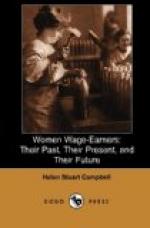The Factory and Workshop Act came as partial solution to the many problems; and though regarded by the working-class as a mass of arbitrary restrictions whose usefulness they denied and in whose benefits they had no faith, it has actually proved the Great Charter of the working-classes. There are points still to be altered,—modifications made necessary by the constant change in methods of production, as well as in the enlarging sense of the ethical principles involved. But our own legislation is still far behind it at many points, and its work is done efficiently and thoroughly. Laws had been made, one by one, fifteen standing on the Statute Books in 1878, when all were abrogated, their essential features being codified in the Act as it stands to-day,—a genuine industrial code in one hundred and seven sections.
Up to this date violation of its provisions had been incessant; but determined enforcement brought about a uniform working day, protection of dangerous machinery, proper ventilation, improved sanitary conditions, an interdict on Sunday labor, and many other reforms in administration. Fourteen years have seen next to no change in the Act, and the condition of women and child workers in factories and workshops has come to be regarded as the best that modern systems of production admit. These workers, whose numbers now mount to hundreds of thousands, are a class apart, and for them legislation has accomplished all that legislation seems able to do in alleviating social miseries. Content with the results achieved, need of further effort in other directions failed of recognition, and apathy became the general condition.
It was during this season of repose that the public mind received first one shock and then another. “The Bitter Cry of Outcast London” appalled all who read; and leaf by leaf the new book of revelations disclosed always deeper depths of misery and want among all workers with the needle,—from the days of the fig-leaf the symbol of grinding toil and often hopeless misery.
Not alone from professional agitators, so called, but from philanthropists of every order, came the cry for help. The Factory and Workshop Act had not touched home labor. The sweating-system, born of modern conditions, had risen unsuspected, and ran riot, not only in East London, but even in back alleys of the sacred west, and in the swarming southwest region beyond London Bridge. The London “Lancet,” the most authoritative medical journal of the world, conservative as it has always been, has at last found that it must join hands with socialist and anarchist, “scientific” or otherwise, with philanthropists of every order, against the new evil and its horrors. Rich and poor alike were involved. The virus of the deadly conditions under which the garments took shape was implanted in every stitch that held them together, and transferred itself to the wearer. Not only from London, but from every city of England, came the same cry; and the public faced suddenly an abyss of misery whose existence had been unknown and unsuspected, and the causes of which seemed inexplicable.




